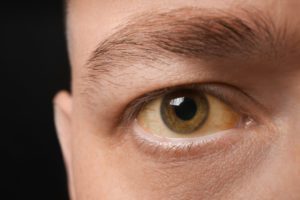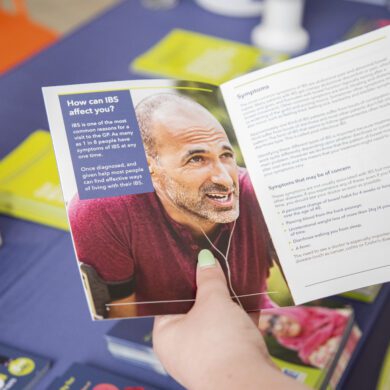Gilbert’s Syndrome
Download printable versionOverview
The liver is the largest solid organ in the body. It lies under the lower part of the rib cage on the right-hand side of the body but stretches across the middle about as far as the left nipple. The liver performs many important functions in the body including processing of many of the body’s waste products (or toxins) to render them harmless. It also produces bile, which is not only needed to digest certain foods, but also helps to absorb several important vitamins. It is helpful to think of the liver as a ‘factory’, which manufactures many important proteins and other chemical substances that the body needs to work normally. The liver helps regulate the energy and fluid stores in the body.
Gilbert’s Syndrome is caused by a defect in the gene that helps make a protein that helps to excrete bilirubin. Bilirubin is a breakdown product of haemoglobin, that occurs in the liver. Haemoglobin is responsible for carrying oxygen in red blood cells. This is a mild defect and results in a small increase in bilirubin in the blood. This does not do any harm and in most people is not even noticeable, although at times of stress for instance after surgery or during an infection such as influenza the levels may rise to be detectable as a mild yellowing of the eyes and skin (this is called jaundice). It’s estimated that 1 in 20 people in the UK have Gilbert’s syndrome.
Causes
Gilbert’s Syndrome is hereditary, meaning it is passed down in a gene through families. There are no other known causes or risk factors, and it is not caused by anything you do such as your lifestyle. It is important to note that apart from mild yellowing of the eyes there are no other symptoms attributable to Gilbert’s and if you are experiencing other symptoms another cause should be sought by discussing the symptoms with your GP. The mild jaundice of Gilbert’s may be brought on by fasting, dehydration, illness, a lack of sleep, or activities that are strenuous for your body such as surgery or lots of physical activity.

Diagnosis
Having Gilbert’s Syndrome does not cause symptoms apart from mild jaundice.
Your doctor will be able to diagnose Gilbert’s Syndrome through a simple blood test to measure your bilirubin levels, and make sure there is no other cause of the jaundice, as jaundice can occur when there are other problems with the liver. It can be confirmed by a genetic test to look for the faulty gene. They may also ask you questions regarding how often you have had jaundice, or about your diet and lifestyle.
Treatment
There is no need to treat Gilbert’s syndrome it is completely harmless. In fact, there is some evidence that people with Gilbert’s syndrome have an increased life expectancy because the higher levels of bilirubin protect against some forms of heart disease.
Support
What should I ask my doctor?
- Do I need to take a fasted bilirubin test?
- Will I need a genetic test to confirm the diagnosis?
- Do I need to stop drinking alcohol, or change my lifestyle in any other way?
- What can I do to prevent the jaundice, and what should I do if it is worse than usual?
Support from other charities
The charity British Liver Trust is the UK’s leading liver health charitiy, working to improve liver health and supporting people affected by liver disease and cancer. Find out more at www.britishlivertrust.org.uk.
Discover more:
Copyright © 2026 Guts UK. This leaflet was published by Guts UK in 2021 and is currently under review. The leaflet was written by Guts UK and reviewed by experts in and has been subject to both lay and professional review. All content in this leaflet is for information only. The information in this leaflet is not a substitute for professional medical care by a qualified doctor or other healthcare professional. We currently use AI translation tools on our website, which may not always provide perfect translations. Please check for further explanation with your doctor if the information is unclear. ALWAYS check with your doctor if you have any concerns about your health, medical condition or treatment. The publishers are not responsible or liable, directly or indirectly, for any form of damages whatsoever resulting from the use (or misuse) of information contained or implied in this leaflet. Please contact Guts UK if you believe any information in this leaflet is in error.



